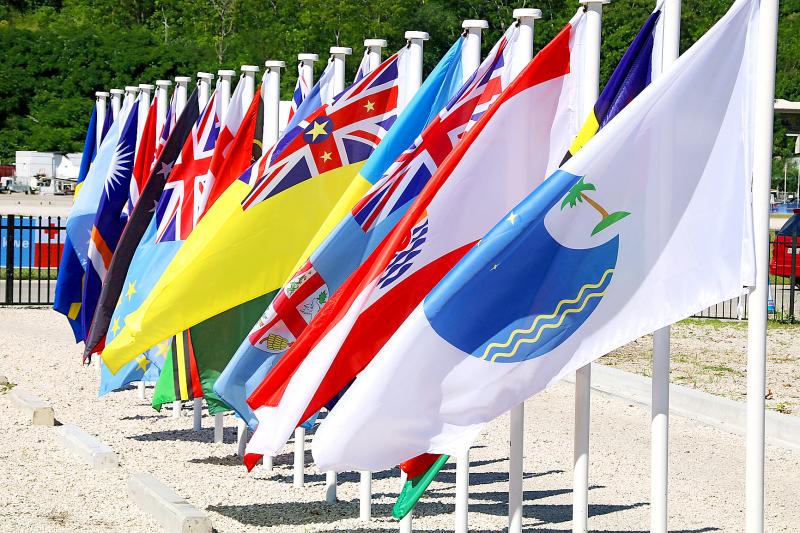Palau yesterday announced it was quitting the Pacific Islands Forum over a leadership row, threatening the future of a key grouping in a region where China and the US are vying for influence.
Palau said its departure was prompted by the failure of its preferred candidate to win election as the grouping’s secretary-general, with four other Micronesian nations also threatening to withdraw over the issue.
The 18-member forum is mostly made up of small island states along with Australia and New Zealand, and is a key element of the US allies’ diplomatic efforts in the region.

Photo: AFP
The five Micronesian countries had argued it was their turn to select the forum secretary-general under an informal arrangement that has stood for decades.
Their preferred candidate was snubbed when former Cook Islands prime minister Henry Puna won a ballot for the post by a single vote on Thursday.
“After recent events the government of the Republic of Palau will be terminating its participation in the Pacific Islands Forum,” the government said in a diplomatic note.
“The process regarding the appointment of the secretary-general has clearly indicated to the Republic of Palau that unity, regionalism and the Pacific way no longer guide the forum,” it added.
The other four members of the Micronesian bloc — the Marshall Islands, Kiribati, Nauru and the Federated States of Micronesia — are to hold a virtual meeting on Monday to discuss following Palau’s lead.
A split in the forum’s ranks could provide an opening for China to boost its influence with the sparsely populated, but strategically important Pacific island nations.
It would also risk diluting the Pacific’s strong message to the rest of the globe on climate change.
Many of the region’s small island states face being inundated by rising seas, and the forum has been a pioneer in raising the issue on the world stage and demanding meaningful action.
Micronesian nations have long felt their north Pacific island states have been neglected in favor of their larger and more influential neighbors in the south.
“What we have seen is a south Pacific that looks down on the north Pacific and we find that deeply unfortunate,” Micronesian President David Panuelo told Australian radio in the wake of the vote.
“It’s a huge fracture in the [forum’s] unity and spirit of cooperation,” he said.
Nauruan President Lionel Aingimea has already signaled his intention to pull out.
“If this is the way Micronesia is treated, then it is better off withdrawing from the Forum,” he said in a statement yesterday.
Palau’s also said that it would close its embassy in Fiji, saying the diplomatic mission was no longer needed now that it was withdrawing from the Suva-based grouping.
“Palau deeply regrets this situation and trusts that its warm bilateral relationship with the Republic of Fiji will continue undiminished,” it said.

The CIA has a message for Chinese government officials worried about their place in Chinese President Xi Jinping’s (習近平) government: Come work with us. The agency released two Mandarin-language videos on social media on Thursday inviting disgruntled officials to contact the CIA. The recruitment videos posted on YouTube and X racked up more than 5 million views combined in their first day. The outreach comes as CIA Director John Ratcliffe has vowed to boost the agency’s use of intelligence from human sources and its focus on China, which has recently targeted US officials with its own espionage operations. The videos are “aimed at

STEADFAST FRIEND: The bills encourage increased Taiwan-US engagement and address China’s distortion of UN Resolution 2758 to isolate Taiwan internationally The Presidential Office yesterday thanked the US House of Representatives for unanimously passing two Taiwan-related bills highlighting its solid support for Taiwan’s democracy and global participation, and for deepening bilateral relations. One of the bills, the Taiwan Assurance Implementation Act, requires the US Department of State to periodically review its guidelines for engagement with Taiwan, and report to the US Congress on the guidelines and plans to lift self-imposed limitations on US-Taiwan engagement. The other bill is the Taiwan International Solidarity Act, which clarifies that UN Resolution 2758 does not address the issue of the representation of Taiwan or its people in

SHIFT: Taiwan’s better-than-expected first-quarter GDP and signs of weakness in the US have driven global capital back to emerging markets, the central bank head said The central bank yesterday blamed market speculation for the steep rise in the local currency, and urged exporters and financial institutions to stay calm and stop panic sell-offs to avoid hurting their own profitability. The nation’s top monetary policymaker said that it would step in, if necessary, to maintain order and stability in the foreign exchange market. The remarks came as the NT dollar yesterday closed up NT$0.919 to NT$30.145 against the US dollar in Taipei trading, after rising as high as NT$29.59 in intraday trading. The local currency has surged 5.85 percent against the greenback over the past two sessions, central

‘MISGUIDED EDICT’: Two US representatives warned that Somalia’s passport move could result in severe retaliatory consequences and urged it to reverse its decision Minister of Foreign Affairs Lin Chia-lung (林佳龍) has ordered that a special project be launched to counter China’s “legal warfare” distorting UN Resolution 2758, a foreign affairs official said yesterday. Somalia’s Civil Aviation Authority on Wednesday cited UN Resolution 2758 and Mogadishu’s compliance with the “one China” principle as it banned people from entering or transiting in the African nation using Taiwanese passports or other Taiwanese travel documents. The International Air Transport Association’s system shows that Taiwanese passport holders cannot enter Somalia or transit there. The Ministry of Foreign Affairs (MOFA) protested the move and warned Taiwanese against traveling to Somalia or Somaliland